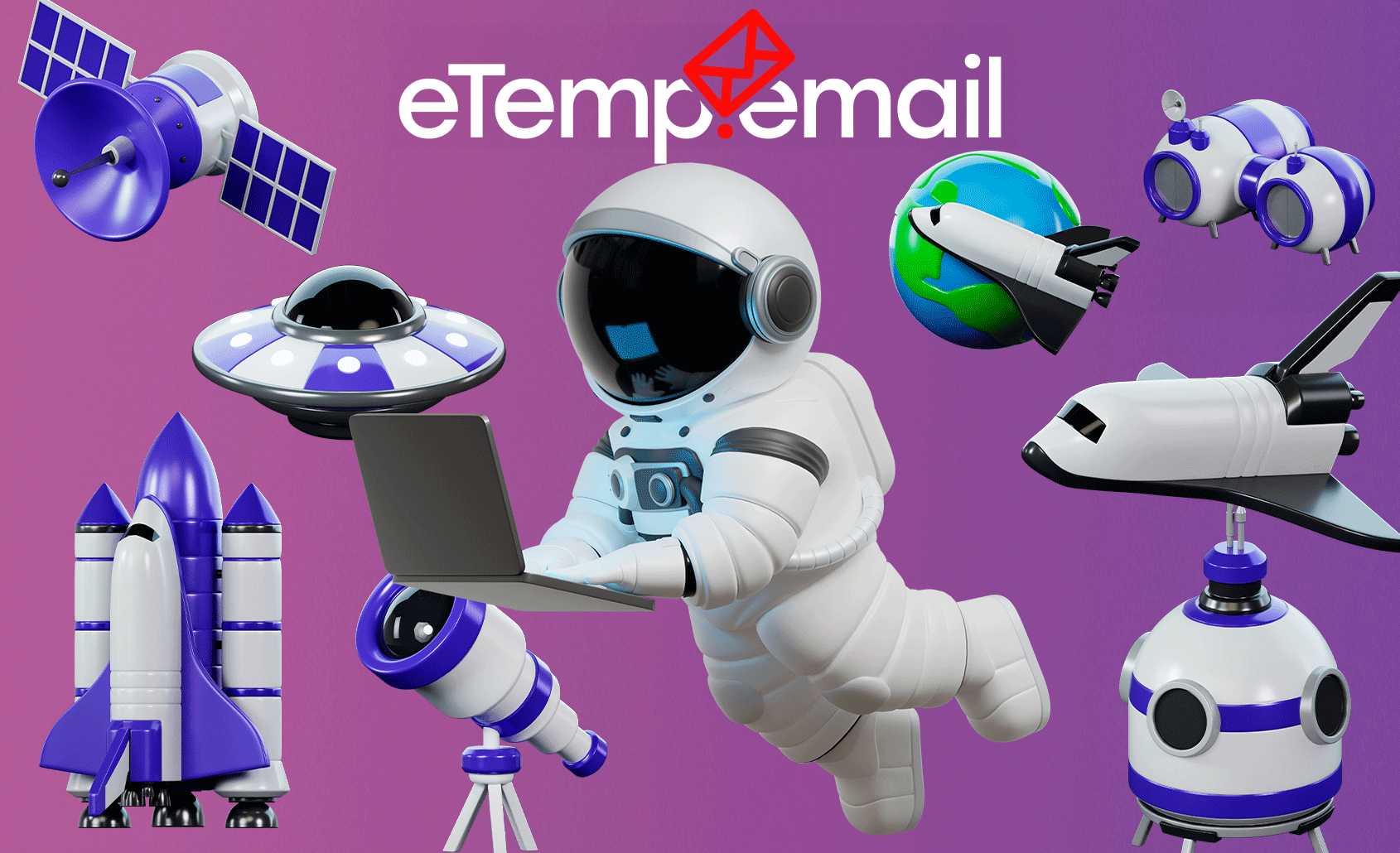

Space Technology: From Global Connectivity to Interplanetary Exploration
In 2025, space technology is experiencing an unprecedented boom, consistently opening up new horizons for humanity. From vast satellite internet constellations connecting the most remote corners of our planet to ambitious plans for establishing human outposts on the Moon and ultimately colonizing Mars, these innovations are profoundly changing our lives both on Earth and far beyond.
However, with the increasing digitalization and interconnectedness of space services and infrastructure, data protection is becoming a critical concern. In this article, we'll delve into the latest groundbreaking developments in the space industry, explore their transformative impact on the future, and explain how eTemp.email helps you interact securely and privately with these advanced, often sensitive, platforms.
What Are Space Technologies? Beyond the Final Frontier
Space technologies encompass a wide array of developments designed for space exploration, satellite communications, Earth observation, and interplanetary missions. In 2025, key areas of rapid advancement and focus include:
- Mega Satellite Constellations: Thousands of interconnected satellites providing global internet access and Earth monitoring capabilities.
- Reusable Rocketry: Innovations dramatically reducing the cost of space launches, making access to orbit more routine.
- Lunar and Martian Base Concepts: Detailed plans and initial steps for establishing sustained human presence off-world.
These technologies are increasingly supported by cutting-edge advancements in Artificial Intelligence (AI) for autonomous systems and data processing, blockchain for secure transactions and verifiable data, and
Breakthroughs in Space Technology in 2025: Transforming Our World
The space industry has made monumental strides, reshaping global communications, scientific research, and the economy:
- Global Satellite Internet Constellations: Leading satellite internet projects are rapidly deploying vast constellations of thousands of satellites, bringing high-speed, low-latency internet connectivity to previously underserved regions worldwide. By 2024, reports indicate these projects had reached a significant percentage of remote areas, dramatically improving access to education, telemedicine, and business opportunities for millions. This infrastructure is vital for bridging the digital divide and enabling connectivity in disaster zones.
- Reusable Rocketry: Making Space More Affordable: Innovative aerospace companies have pioneered and perfected the use of reusable rockets, significantly reducing the cost of space launches. By recovering and re-flying first-stage boosters, these designs have cut launch expenses by a substantial margin, making space far more accessible for a broader range of participants, from scientific research missions to commercial startups and even future space tourism ventures.
- Ambitious Lunar and Martian Exploration Plans: Global space agencies and private ventures are actively preparing for ambitious crewed missions to the Moon and Mars. Major lunar programs aim to return humans to the Moon by 2026, establishing capabilities for sustained lunar presence and resource utilization. Ambitious interplanetary initiatives are targeting the first human footsteps and even initial base construction on Mars by 2030, laying the groundwork for a truly interplanetary future.
How Is Space Technology Changing Lives? Impact on Earth and Beyond
Space technology's influence extends far beyond orbit, impacting daily life and opening up unprecedented prospects for humanity:
- Unprecedented Global Connectivity: Satellite internet brings reliable internet access to areas lacking terrestrial infrastructure, enabling critical services like remote healthcare, online education, and remote work to flourish globally. This also supports emerging technologies like precision agriculture and autonomous vehicles in rural areas.
- Advancing Science and Climate Monitoring: Earth observation satellites provide invaluable data for scientific research, from tracking climate change indicators (deforestation, ocean temperatures, ice melt, pollution) to monitoring natural disasters, aiding in prediction, response, and the development of
green technology solutions - Booming Space Economy: The commercial space market is experiencing explosive growth, encompassing launch services, satellite manufacturing, in-orbit servicing, space tourism, and even nascent ventures in asteroid mining. This rapidly expanding sector is driving innovation and creating entirely new industries and job markets.
Risks and Challenges: Safeguarding Our Digital Frontier
The increasing digitalization and interconnectedness of space services, from satellite communication networks to mission control systems, introduce unique and significant cybersecurity threats:
- Data Leakage in Satellite Communications: Satellite communication platforms process vast amounts of user data, including location information, communication content, and usage patterns. If these platforms are compromised, such sensitive data could be leaked, leading to privacy breaches, surveillance risks, or targeted attacks.
- Sophisticated Phishing and Fraud: Cybercriminals leverage public fascination with space by creating highly convincing fake space service websites, fraudulent investment schemes (e.g., "space land sales"), or deceptive crowdfunding campaigns designed to steal credentials, financial information, or valuable crypto assets.
- Cyberattacks on Space Infrastructure: Satellite networks and ground control systems are critical infrastructure. Successful cyberattacks could lead to disruption of essential services (navigation, weather forecasting, communications), intellectual property theft related to advanced space tech, or even geopolitical instability if satellites are jammed or hijacked.
To interact securely with space services, such as signing up for satellite internet platforms, participating in citizen science missions, or exploring space-related applications, it is essential to prioritize your digital privacy. Using
The Future of Space Technology by 2030: An Interplanetary Era
By 2030, space technology will have fundamentally reshaped our civilization, pushing humanity further into the cosmos. Experts predict:
- Mass Access to Space and Tourism: Thanks to drastically lower launch costs and innovations in spacecraft design, space tourism will become more accessible, with suborbital flights and even orbital hotels becoming a reality for a broader segment of the population.
- Permanent Lunar Bases: Sustainable human settlements on the Moon will begin to take shape, serving as scientific outposts, testing grounds for Martian missions, and sites for resource extraction, including valuable elements like helium-3.
- Initial Martian Colonization Efforts: Ambitious plans will see the first human colonists embarking on missions to Mars, establishing foundational habitats and infrastructure, thereby setting the stage for a nascent interplanetary economy and a multi-planetary future for humanity.
- Advanced Data Processing and Security:
Quantum computers blockchain technology
How Does eTemp.email Help in the Space Age? Your Digital Shield
Engaging with space-related platforms—from signing up for satellite internet services and participating in scientific research projects to exploring new space tourism ventures—requires heightened caution regarding your personal data. eTemp.email provides a crucial layer of digital protection in this exhilarating new frontier:
- Create Temporary Email Addresses in Seconds: Rapidly generate unique, disposable email addresses for each new space service you want to explore, without exposing your primary, long-term email.
- Avoid Phishing and Spam: Shield your main inbox from unwanted marketing communications, newsletters, or malicious phishing attempts that might originate from less secure or experimental space platforms.
- Maintain Anonymity When Testing Space Technologies: Explore and experiment with cutting-edge space applications and beta environments without linking your personal identity or primary email to potentially unknown data collection practices.
- Isolate Risk: If a space platform experiences a data breach, only your temporary email is compromised, keeping your primary digital identity secure and preventing unwanted information from reaching your main inbox.
Conclusion
From providing global connectivity via satellite internet to making interplanetary travel a tangible reality, space technology in 2025 is breaking new ground and inspiring humanity. However, its rapid digitalization necessitates increased vigilance and robust cybersecurity practices to protect valuable data.
By leveraging trusted tools like eTemp.email, you can securely interact with space platforms, experiment with new services, and contribute to the space revolution without risking your personal data. Try




